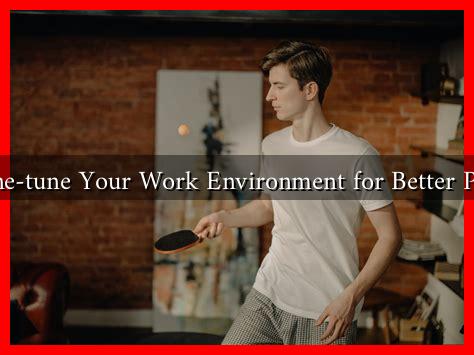-
Table of Contents
How to Fine-tune Your Work Environment for Better Productivity
In today’s fast-paced world, productivity is a key factor in achieving both personal and professional success. However, many individuals struggle to maintain focus and efficiency in their work environments. Fine-tuning your workspace can significantly enhance your productivity levels. This article explores various strategies to optimize your work environment, supported by research and practical examples.
The Importance of a Productive Work Environment
A well-structured work environment can lead to increased efficiency, creativity, and overall job satisfaction. According to a study by the Gartner Group, 75% of remote workers expressed a desire to continue working remotely, highlighting the importance of a conducive work environment. A productive workspace not only boosts individual performance but also fosters collaboration and innovation among teams.
Key Elements of an Optimized Work Environment
To create a workspace that enhances productivity, consider the following elements:
- Ergonomics: Invest in ergonomic furniture that supports your posture. A comfortable chair and desk can reduce fatigue and discomfort, allowing you to focus better.
- Lighting: Natural light is essential for maintaining energy levels. If possible, position your desk near a window. If not, consider using full-spectrum bulbs that mimic natural light.
- Noise Control: Excessive noise can be distracting. Use noise-canceling headphones or soundproofing materials to create a quieter environment.
- Organization: A cluttered workspace can lead to a cluttered mind. Keep your desk organized and use storage solutions to minimize distractions.
- Personalization: Adding personal touches, such as plants or artwork, can make your workspace more inviting and inspire creativity.
Creating a Distraction-Free Zone
Distractions are one of the biggest productivity killers. Here are some strategies to minimize interruptions:
- Set Boundaries: Communicate with colleagues or family members about your work hours to minimize interruptions.
- Use Technology Wisely: Utilize apps that block distracting websites or notifications during work hours.
- Designate a Workspace: If working from home, create a specific area dedicated to work to mentally separate work from leisure.
Incorporating Breaks and Movement
Taking regular breaks is crucial for maintaining productivity. Research from the National Institutes of Health suggests that short breaks can enhance focus and creativity. Here are some effective ways to incorporate breaks into your work routine:
- Pomodoro Technique: Work for 25 minutes, then take a 5-minute break. After four cycles, take a longer break of 15-30 minutes.
- Stretching and Movement: Use breaks to stretch or take a short walk. This can help reduce physical tension and refresh your mind.
- Meditation: Consider short mindfulness exercises during breaks to clear your mind and reduce stress.
Case Studies: Successful Work Environment Transformations
Several companies have successfully transformed their work environments to boost productivity:
- Google: Known for its innovative workspaces, Google incorporates open spaces, relaxation areas, and recreational facilities to foster creativity and collaboration.
- Buffer: This social media management platform emphasizes remote work and flexible hours, allowing employees to create their ideal work environments.
- Microsoft: The company has invested in ergonomic furniture and collaborative spaces, resulting in a reported 20% increase in employee productivity.
Conclusion
Fine-tuning your work environment is essential for enhancing productivity. By focusing on ergonomics, lighting, noise control, organization, and personalization, you can create a workspace that fosters efficiency and creativity. Additionally, minimizing distractions and incorporating regular breaks can significantly improve your focus and overall well-being. As demonstrated by successful companies, investing in a productive work environment pays off in terms of employee satisfaction and performance. Take the time to assess and optimize your workspace, and watch your productivity soar.

